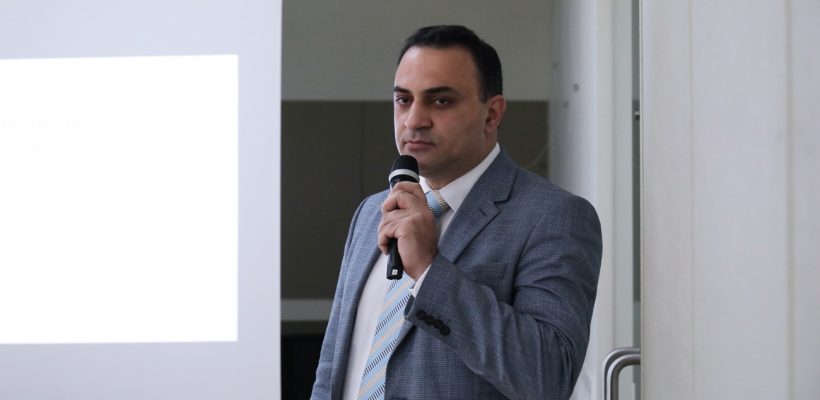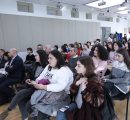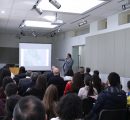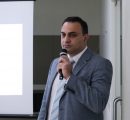
Vahagn Vardanyan (MBA ‘97) on Singapore’s Development Philosophy
3 min readYEREVAN, Armenia – On January 29, 2019, the American University of Armenia (AUA) Political Science and International Affairs (PSIA) program held a seminar on the Development Philosophy of a Small Nation-State: The Case of Singapore. The seminar was led by Dr. Vahagn Vardanyan (MBA ‘97), the international principal at Han (Chinese) Academy in Hong Kong.
In his opening remarks, PSIA Program Chair Associate Professor Dr. Vahram Ter-Matevosyan mentioned that Singapore’s development is often referred to as a model to follow: “It is essential to understand the extent to which success stories, such as the one of Singapore, can be useful for a country with differing initial development conditions – geographic-historical, political-economic, and social-cultural.” Dr. Ter-Matevosyan then introduced the speaker and invited him to take the floor to discuss the principles of long-term strategic planning and good governance with a unique role allocated to geography.
Dr. Vardanyan highlighted the importance of studying Singapore’s success story. He considers it one of the most famous stories in the contemporary world for its distinctive economic and political success. Singapore’s example can be an essential lesson to learn how unfavorable conditions and limitations can be transformed into advantages and opportunities. National progress assumes not imitating others’ routes, rather patterning and advancing its own development model and further strengthening national identity.
Talking about Armenia’s unique geopolitical situation, Dr. Vardanyan noted that Armenia is among three landlocked nation-states with distinct political challenges. The speaker elaborated that such countries are those that have no diplomatic relations with at least one of their neighbors, whereas, in the case of Armenia, no diplomatic relations exist with two of its neighbors, which makes self-defense the country’s primary responsibility.
“Having Singapore as an example of a small nation-state, which has survived and prospered, despite having nearly zero chances for it at start, is motivating,” said Dr. Vardanyan. “Armenia faces an increasingly stronger competition and is standing on a road where it needs to become open to learning from past experience both its own and others’. This is probably the main lesson to learn, the tests of which the Armenian nation has failed several times in its history.”
When Singapore gained independence, it had a near-zero chance of survival politically, economically, or militarily, according to Singapore’s founding Minister of Foreign Affairs. Moreover, upon its independence in 1965, the President of Indonesia labeled it as a “Red Dot” saying that the country will not survive and will not be anything significant neither in global politics nor in regional politics. Thereafter the “Red Dot” became the nickname of Singapore used with the intention to highlight the country’s success despite its limitations.
In his speech, Dr. Vardanyan mentioned that Singapore has the highest-paid public officials in the world, which in turn reduces the corruption rate in the country. “If government workers are adequately paid, they deserve to be punished with severe penalties when they take bribes,” the speaker recalled a quote by Lee Kuan Yew, the first prime minister of Singapore.
Among key developing principles and outcomes, Dr. Vardanyan mentioned the promotion of a strong saving discipline – 45% of their income over the decades is saved. This is the 2nd position in the world after China with 50%.
In conclusion, the speaker brought forward another significant point that makes Singapore a unique example to emulate – the willingness to learn. Dr. Vardanyan noted the absence of arrogance in the government and public administration of Singapore, particularly as applied to learning, underscoring the importance of learning from one’s own and others’ experiences without compromising on one’s own identity and distinction.
The presentation was followed by a Q&A session, during which the audience had the opportunity to seek elaborations on some key arguments in the presentation and the feasibility of applying Singapore’s principles of development in Armenia.
The Political Science and International Affairs (PSIA) program of the American University of Armenia (AUA) equips students with advanced analytical reasoning, critical thinking, and communication skills through the study of political science and international affairs, emphasizing local and global perspectives and practical applications of theory. The program provides world-class teaching and research, producing graduates who can best contribute to the development of the nation.




